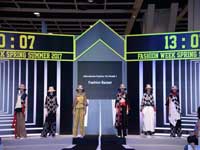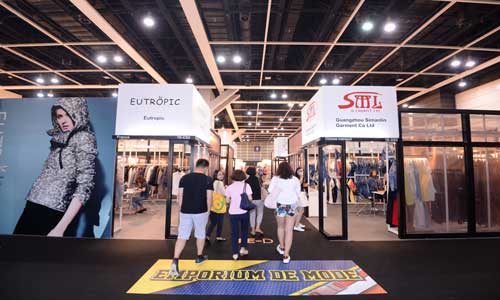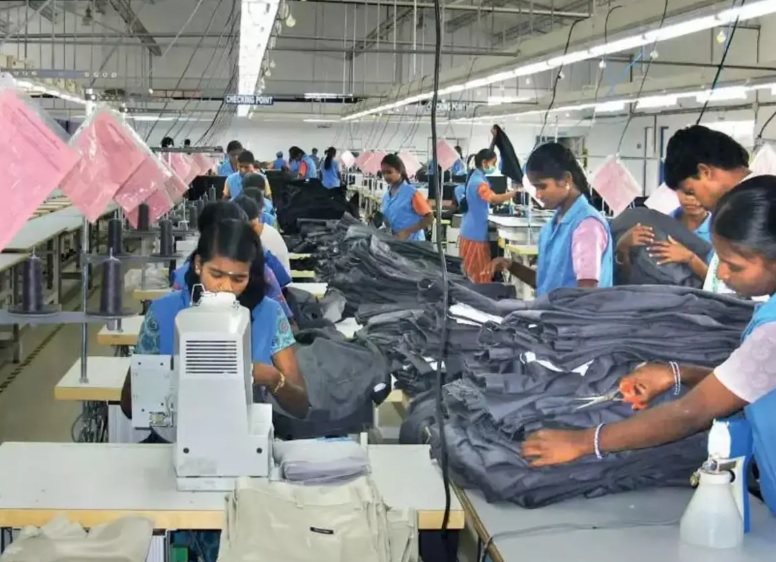FW
"The 24th Hong Kong Fashion Week for Spring/Summer opened today at the Hong Kong Convention and Exhibition Centre and will run until July 13. Organised by the Hong Kong Trade Development Council (HKTDC), the show gathers nearly 1,100 exhibitors from 20 countries and regions, serving as an ideal one-stop sourcing platform for the industry. Exhibits feature the latest fashion designs, international brands, garments, fabrics and accessories."

The 24th Hong Kong Fashion Week for Spring/Summer opened today at the Hong Kong Convention and Exhibition Centre and will run until July 13. Organised by the Hong Kong Trade Development Council (HKTDC), the show gathers nearly 1,100 exhibitors from 20 countries and regions, serving as an ideal one-stop sourcing platform for the industry. Exhibits feature the latest fashion designs, international brands, garments, fabrics and accessories.
Under the theme ‘Style in Motion’, 20 fashion events will be held at the fair, including fashion shows, trend forecasting seminars, buyer forums and a networking reception, presenting the latest market intelligence and fashion items. This year’s show will also feature new exhibitors from Canada, Nepal, Saudi Arabia and Vietnam; along with eight pavilions from India, Indonesia, Japan, Macau, Thailand, and first-timers Italy, Korea and Nepal.
Fashionable Sportswear zone debuts

Reflecting global trend towards athleisure this year’s Fashion Week for Spring/Summer opens the new Fashionable Sportswear and Urban Clothing zones to help buyers easily locate relevant products and suppliers. Other zones catering to specific industry interests include the Fashion Gallery, featuring a wide array of high fashion items; the International Fashion Designers’ Showcase, gathering exquisite collections of global fashion designers; as well as the diverse womenswear and Fabrics & Yarn zones. To help buyers easily find their sought-after products, the HKTDC is housing all fashion accessories-related zones, including footwear, leggings & socks and gloves, scarves shawls, in the inaugural World of Fashion Accessories section. In addition, the show has once again set up a Small Orders zone, featuring nearly 100 showcases and garment racks with about 400 products available for orders in minimum quantities of between five and 1,000 pieces.
Meanwhile, at the new Urban Clothing zone, an Italian exhibitor is displaying a range of locally designed and manufactured casual denim wear, while the Italian Trade Commission Hong Kong and Assocalzaturifici are showcasing 50 styles of Italian shoes under the theme ‘The Seduction of Footwear: Italian Glamour’. Experts from trend forecasting agency WGSN will share the upcoming season’s footwear trends tomorrow.
New launches
At the Fabrics & Yarn zone, The Woolmark Company is featuring its new Wool Denim, which apart from being anti-odour, also provides better warmth retention than normal denim and is machine-washable. The company will also host a seminar titled ‘New Generation of Merino innovation – Wool Denim Wear & Wool Sneakers’ tomorrow morning. Other exhibitors include the Japanese sports brand Sangacio, which has incorporated precise manufacturing techniques from Kobe with Italian Florentine design, selecting the finest cow leather to produce handcrafted sports shoes. Besides, Hong Kong exhibitor Titane Group (Hong Kong) Ltd has taken inspiration from the rims of sports cars to manufacture a series of delicate interchangeable cufflinks for matching different styles.
To create more business opportunities for exhibitors, the HKTDC has organised 90 buying missions, bringing more than 5,000 buyers from 45 countries and regions to the show. They include representatives of renowned fashion labels, mega chain stores and major distributors, such as the Czech Republic’s Zoot, Germany’s Unito Fashion, Japan’s Isetan, Russia’s Melon Fashion Group, Taiwan’s Keraia, Thailand’s The Mall Group, and the United Arab Emirates’ Just Lounge.
Fashion trends and market drivers
A series of seminars and forums will be held during the show, including a presentation by international trend forecasting group Fashion Snoops on their Autumn/Winter 2018/19 fashion forecasts, and a seminar jointly organised with the Hong Kong Research Institute of Textiles and Apparel (HKRITA) on ‘Wearable Technologies for Future Fashion,’ where four experts will share their thoughts on knitting technologies, health concerns and quality of wearable technologies. On Wednesday, a seminar titled ‘Tips on Marketing Your E-tailing Business’ will feature seasoned industry experts discussing marketing strategies for online sales, while a ‘Testing and Certification Services for Textiles and Garments’ seminar will also be held on the same day.
Talented designers present their latest works
During the fair, a number of runway shows will be staged, including fashion parades by local fashion design graduates, allowing them to demonstrate their talent on the Fashion Week stage. Tomorrow, students from the Chinese University of Hong Kong’s School of Continuing and Professional Studies will stage their graduation parade. The Hong Kong Polytechnic University will also host a graduate fashion show and lingerie show tomorrow and on Wednesday, while the Technological and Higher Education Institute of Hong Kong will stage a graduation show tomorrow.
New designs are launched at Fashion Week shows, with Indonesian brand Neusa by Purana unveiling its latest collection blending traditional Indonesian fabric with modern designs at this morning’s international fashion parade. Another parade today spotlights a new exhibitor from Saudi Arabia, showcasing its latest ethnically rich designs. In addition, Macau brand Chavin and the Macau Productivity and Technology Transfer Centre will host international fashion parades on Wednesday, with Chavin featuring its evening wear and wedding gown series under the theme of ‘Nouvel Collection’.
Silverman Holdings, based in China, wants to sell its fabric subsidiary and give focus on its film and television business. Rising challenges facing the textile industry in China is one of Silverman’s main reasons in letting go of its fabric business. The company also plans to change its name to Starrise Media Holdings.
Over the recent years, the textile industry in China has faced various challenges, including increasingly fierce competition, rising domestic production costs, and weakening market demand for textiles both within and outside China.
Silverman is engaged in the design, manufacture and sale of high-end home textile and apparel fabrics and fabric products using a wide spectrum of functional, differentiated and new fibers such as cotton, milk fiber, soybean fiber, bamboo fiber, among others. The group has 1,000 sets of advanced weaving machines including more than 250 sets of high speed jacquard looms. The annual fabric production capacity is 80 million meters.
Its principal products are jacquard fabrics and dobby fabrics. It also provides processing services for fabric products to certain customers. Silverman is committed to ensuring continued innovation, improving management, achieving efficiency and enhancing brand image. It will continue to actively seek out new development opportunities and will strive to generate a healthy profit and return for shareholders.
Gigi Hadid is the new face of Reebok. Reebok is not Hadid’s only major sportswear campaign. Tommy Hilfiger also will continue its partnership with Hadid, who has both walked the runway and collaborated on collections for the brand. The 22-year-old recently partnered with Vogue as well to create a new eyewear collection.
Her sister Bella is signed to Nike. Reebok is one of many sportswear brands to sign young supermodels to act as spokespeople. Adidas recently recruited Kendall Jenner as its latest ambassador. Gigi is known for dressing her curves—from midriff-baring two pieces to curve-hugging dresses and plunging necklines. She is a Sports illustrated model. The Hadid sisters have a combined 48.4 million Instagram followers.
The Reebok brand was born, and named, in 1958 to advance a legacy that began 68 years prior in the United Kingdom. Once Reebok made its way to America, it expanded beyond running sneakers to gain traction in football, basketball, and other sports. It has had top endorsers. Aside from running, the men’s and women’s shoes are versatile enough to fare well in cross training, performance activities and casual purposes. Reebok continually grows as a brand, introducing new technologies and technical features to improve its sports lineup, especially in running.
GST has led to a hike of 25 to 30 per cent in the cost of Chikan garments. Chikan goods had been exempt from tax since independence but now they are in the taxable category of readymade clothes.
Manufacturers have to start paying a 12 per cent service tax for employing artisans for various steps of manufacturing chikan clothes. There are 11 processes before the embroidered cloth finally reaches customers, including cutting, sewing, printing, embroidery, washing, charak etc and more than six workers are employed at each step, so there is bound to be a proportionate hike in the cost of garments.
With the implementation of GST, the process and equipment for chikan embroidery is costlier, so until the picture is clear traders are not placing any fresh orders. Chikan garments below Rs 1,000 will now come under the five per cent tax bracket and those costing more will be taxed at the rate of 12 per cent.
Fabrics and yarn, the two most essential items for the business, are now taxable at the rate of five per cent. The word chikan is probably derived from the Persian word chikin or chikeen, which means a kind of embroidered fabric. This art has its own royal significance covering the Mughal period to the era of the Oudh nawabs, later growing as a fashion-centric form of needlecraft recognised the world over.
Wrangler plans to increase its supply of sustainable cotton in the US. The denim brand has joined Field to Market: The Alliance for Sustainable Agriculture as an associate member.
The initiative works to unite the agricultural supply chain in defining, measuring and advancing the sustainability of food, fiber and fuel production in the United States. By providing useful measurement tools and resources, Field to Market helps brands and growers track and promote continuous improvement at the field and landscape levels. Wrangler buys roughly 50 per cent of its cotton from US growers and would like for it to be produced as sustainably as possible.
As the first major apparel brand to join Field to Market, Wrangler is taking a leadership role in catalyzing continuous improvement in the sustainability of US cotton. It believes supply chain collaboration is essential to not only advancing environmental goals but also communicating farmers’ conservation efforts to consumers.
The brand will coordinate with Field to Market to focus on cotton-growing practices that reduce environmental impacts and improve profitability for growers.
Ultimately, Wrangler aims to work with Field to Market to expand upon this pilot to create a program that includes more of growers who are focused on continuous improvement for healthy soils.
The US will train Kenyans for employment in the textile industry. This is the arrangement between Hub and Generation Program Kenya. Seven fully equipped training centers will be put up in the country. About 4,000 youngsters will be screened for participation after which 2000 of them will be trained and employed to help address the skills gap that currently hinders growth in the sector. The goal of the pilot is to create a sustainable and replicable model for apparel sector skills development throughout East Africa.
East Africa is establishing itself as a key sourcing destination for buyers of global apparel, footwear and travel goods. Recently, renewed to 2025, the African Growth and Opportunity Act (AGOA) is a major incentive which provides up to 35 per cent in duty savings for eligible countries exporting to the US. This new initiative will further cement partnerships between the US and East African businesses.
Not only does this private sector approach directly link trained at-risk youth to jobs, the leadership from Kenya’s ministry of industry, trade and cooperatives makes the model sustainable. Launched in 2015, Generation Kenya has so far successfully graduated 4400 trainees from among disadvantaged youth, placing them in the fast moving consumer goods distribution, retail, financial services and hospitality industries.
Selvedge Run was held in Germany, July 4 to 6, 2017. The show was about specialized retailers and lovers of traditional craftsmanship, Japanese denim, indigo, heavy leather accessories, hard boots, work wear-inspired collections and all things heritage.
Beards, boots and selvedge denim dominated the look of exhibitors and visitors. The fair also hawked an in-house barber's products. Overall, the portfolio had a round and homogenous effect. There were known labels like Lee Cooper, Blaumann and Baptist B. There were new international exhibitors such as Nigel Cabourn and the Japanese jewelry label Chaff.
Selvedge Run is a trade show for quality garments, shoes, accessories and lifestyle goods. It is a home for brands with character. The name is taken from the technical term for the narrow, tightly woven, self-finished edges most commonly associated with high-quality denim.
Longevity and transparency rather than a fast fashion approach is what Selvedge Run is looking for: a preference for not outsourcing to low wage countries and a closer geographic and cultural link between design and manufacturing with, wherever possible, a commitment to fair and sustainable production conditions. Brands that have a close connection to a specific region and its cultural and economic heritage are preferred.
Cotton prices in Pakistan will remain on the higher side due to growing demand for the commodity by textile and spinning sectors and higher costs of imports. Physical prices and the arrival of the fresh crop will become steady by the end of September as there would be an influx of around 25,000 bales on each working day.
Import of cotton is not viable as international prices are on par with prices in Pakistan. Garments made-up and the spinning sector might go for imports during December-January 2018. Usually, the textile sector needs to import lint every cotton season to meet the shortfall.
The target for the crop season 2017-18 may not be met. There would be a shortfall of around 2.1 million bales. Recent lint prices are the outcome of excess demand for the commodity in the domestic market. Owing to an increase in planted area, world lint production will rise by two per cent. China’s cotton production is estimated at 4.9 million tons. US production is estimated at 3.8 million tons.
World cotton mill use is expected to remain stable at 24.3 million tons in 2017-18 as high cotton prices have discouraged growth in demand. The US comes next with 19.86 million bales followed by India with 21.75 million bales and Pakistan with 12.17 million bales.
Premium was held in Germany, July 4 to 6, 2017. This is a major trade show for advanced contemporary fashion. It was packed with a portfolio of premium fashion collections. Apart from the well-known established premium brands such as American Vintage, Antony Morato and Second Female there were also a lot of newcomers such as Aubergin, aintnobasic, Cords from Stockholm or twenty tees that showed for the very first time at Premium.
Those who hoped for inspiring newness were dashed. Flower prints, stripes and embellishments and a lot of ’80s and ’90s styles dominated most of the collections. The kimono/bathrobe piece seems to be a must-have for next summer and print and logo shirts and sweaters could be seen everywhere. Windbreakers also experienced a revival. Key denim looks included highly decorated styles, high-waist mom jeans, flares and trendy baggy silhouettes. And although the color palette seemed to offer every hue for spring/summer 2018, purple, yellow and baby pink were the top colors for men and women.
The event defines the key trends: each season, the latest lifestyle fashions, trends and global market developments are analysed and the portfolio updated to include at least 25 to 30 per cent of new, commercial, high-end collections.
Show & Order was held in Germany from July 4 to 6, 2017. This specialized trade show offering feminine fashion, accessory and footwear brands was characterized by a cool, comfy and relaxed atmosphere.
The show’s top trends for spring/summer 2018 include: big doses of Ibiza and summer holiday inspiration with lots of ethnic shirts in Sangallo lace, decorated with embroideries, prints and trimmings. Pops of gold and silver completed many of the dresses and shirts on offer.
Some denim brands at the show offered premium quality products focused on eco-friendly and careful manufacturing standards. Accessories were also important and included flip-flops, espadrilles and sandals, delicate silver and gold jewels, funky decorated straw bags and essential and minimalistic urban leather ones.
Happy Haus, a French-German brand, offered denim dresses, shirts and overalls all made with sustainable denims produced and treated according to eco-friendly production standards. Distinct winter and summer capsule collections completed the collection. Special collabs with international artists included limited edition fancy pieces.
Women’s jeanswear line Ally John employs Japanese denims only, including stretch selvedge ones. The selection offered high-waisted jeans for women that guarantee maximum comfort and self-confidence. Each piece carried in its inner side an embroidered quote of a woman who inspired that model–such as Madonna, Audrey Hepburn or others.












